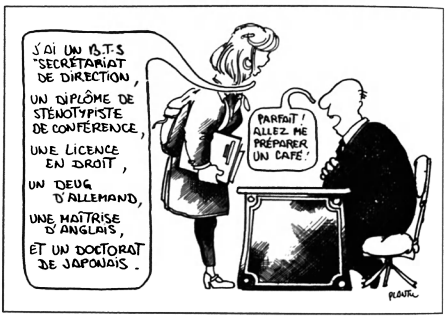13.3: With whom are you going to the movies Friday night?
- Page ID
- 142350
Questions et Réponses
D. With whom are you going to the movies Friday night?
- —Avec qui vas-tu au cinéma vendredi soir?
- —Avec Jean-Claude. Pourquoi?
- —Parce que, moi, je devais aller avec lui au concert vendredi!
- —Chez qui dînez-vous ce soir?
- —Nous dînons chez nos amis, les Beaufort.
- —Ah, oui? J'ai dîné chez eux le weekend passé.
- —Tu es sûr? On peut compter sur Louise?
- —Bien sûr. On peut compter sur elle.
- (On frappe à la porte.)
- —Qui est là?
- —Moi, ... Françoise.
- (Le téléphone sonne. Marc décroche et répond.)
- Marc:—C'est pour toi, Philippe.
- Philippe:—Zut! C'est Marie?
- Marc:—Oui, c'est elle.

DEVOIR, to owe (simplest meaning; not very frequent).
to have to, to expect to (meaning varies according to tense).
| Présent: | |
| Je dois partir à six heures. | I'm to leave at six o'clock. |
| Tu dois le faire. | You have to do it. |
| Elle me doit cinq cents francs. | She owes me five hundred francs. |
| Nous devons y aller. | We have to go there. |
| Vous devez l'aider. | You have to help him. |
| Ils doivent comprendre. | They must understand. |
| Imparfait: | |
| Je devais partir à six heures. | I was to leave at six. (expected) |
| Futur: | |
| Je devrai l'aider. | I'll have to help him. (obligation) |
| Conditionnel: | |
| Je devrais l'aider. | I ought to help her. |
| Passé composé: | |
| J'ai dû l'oublier, (probability) | I must have forgotten it. |
| Passé du conditionnel: | |
| J'aurais dû l'aider. | I should have helped her. |
Grammar Notes: This set of examples seems complex because there are various meanings and it includes some verb forms that have not yet been introduced formally. We won't expect you to produce the correct form of devoir without clear hints at this time. Also, note that this, like so many other problem cases, is a vocabulary question, not a grammar question. You have to learn by memorization or by frequent use when devoir means "ought to," "is expected to," "probably did," and so on. You have to express these notions for everyday communication, so it is worth the effort. (See Reference Grammar, 24.)
Lecture
Les Entrevues Professionnelles1
| Passer de l'état d'étudiant à celui de travailleur, c'est difficile. Les études sont de plus en plus longues et cet allongement a dévalué toute une série de diplômes. Toutefois0 les diplômes restent indispensables. Pour assurer des fonctions de plus en plus complexes, les entreprises ont besoin de jeunes talents susceptibles de bien s'intégrer,0 de bien apprendre, voire0 de bien évoluer. Lors d'0un entretien avec une entreprise, il faut d'abord être en bonne condition, physiquement et psychologiquement. Il est indispensable de connaître les faits importants sur l'entreprise. Il faut aussi être disponible,0 ne jamais refuser un test et ne jamais se montrer pressé. La maturité de chaque candidat sera jugée ainsi que l'aptitude de travailler en équipe,0 l'autonomie et l'ouverture d'esprit. Inutile de claquer des dents,0 les chargés de ressources humaines0 dignes de ce nom sauront vous mettre à l'aise. |
0 nevertheless 0 integrate themselves/in short, in sum 0 at the time of 0 available (willing to accommodate to their schedule) 0 in a team 0 claquer... chatter your teeth / chargés... those charged with human resources (personnel directors) |
1 (Adaptation d'un article d'Antonia Cerrutti dans L'EXPRESS du 17-23 juin 1988)

Common and Uncommon Knowledge
- Nommez deux marques d'automobiles fabriquées en France.
- Qui est Jacques Cousteau?
- Le Vouvray, c'est un vin mousseux. C'est du champagne?
- La "houille blanche" (white coal) est une source d'énergie en France. Nommez une autre source d'énergie, très importante, mais très controversée.

